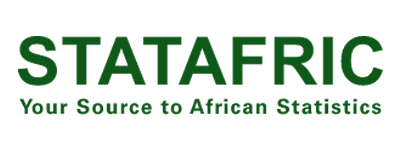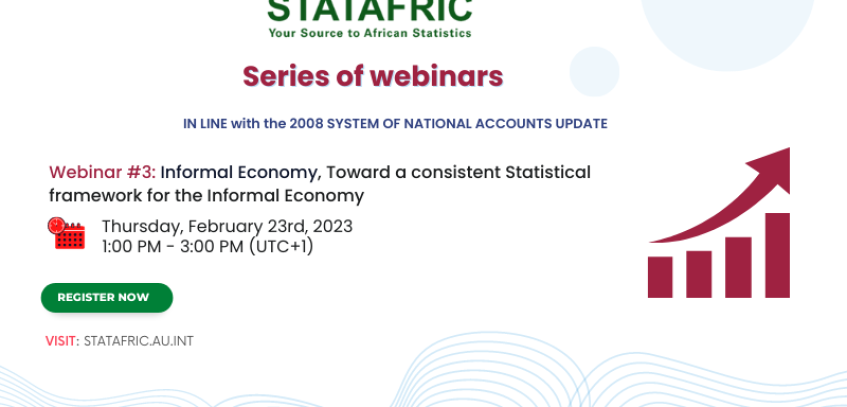In line with the "2008 SNA update" webinar series, STATAFRIC organizes its 3rd webinar on Informal Economy, Toward a consistent Statistical framework for the Informal Economy.
1. Background
The System of National Accounts (SNA) is designed to provide a realistic and compact view of the economy suitable for policy and analytical use. As the economy evolves and policy and analytical needs change, the SNA should be revised periodically to reflect the real changes taking place within economies, the evolution of financial and fiscal instruments, and the improvements in accounting methodologies. The SNA, as a macroeconomic statistical manual, is regularly being revised to reflect changes to the economy, to process improvements in the measurement of specific economic phenomena, and/or to update the way in which results are presented to users. The last version of the System of National Accounts dates to 2008 and a lot has changed since then.
For the current 2008 SNA revision, started upon the 52nd United Nations Statistical Commission in 2021, several workstreams organized by the National Accounts Advisory Expert Group (AEG) and Task Teams were launched to resolve issues related to priority areas. Consolidated guidance notes GN were developed (or are under global consultation) for each of the prioritized issues covering both conceptual and practical guidance. Identified issues have been grouped into the following main areas: globalization, digitization, well-being and sustainability, Islamic finance, communications, payment and financial systems, informal economy; statistical units and balance of payments; and the long-term research program of the SNA. The long-term SNA research agenda includes issues that would not be addressed for the 2008 SNA update.
This work is coordinated under the auspices of the Inter-Secretariat National Accounts Working Group (ISWGNA) to ensure global representation in the deliberation of issues under consideration and the successful implementation of the results in international standards or manuals. Proposals for working groups or expert groups to carry out research on specific topics should be submitted to the ISWGNA, which will assess the results in accordance with the SNA update procedures established by the United Nations Statistical Commission.
2. Objective of the series of webinars
The African Union Commission, through African Union Institute for Statistics (Statafric), and in line with its commitment to further harmonizing and upgrading official statistical systems across Africa, seeks to support and accompany the compilers of national accounts in African countries in this updating process and mobilize their possible contribution. Indeed, through the PAS program, Statafric has already provided a wide range of technical assistance to African countries in the field of national accounts. While in this context of the SNA update, Statafric aims to tag along with national accountants in Africa, enable/coordinate their active participation and support them in clinging to the current update process.
This webinar is the first in a series of regional seminars within the framework of the updating process of the System National Account (SNA) and is organized by Statafric, in collaboration with the Economic Commission for Africa (UNECA). In general, these webinars aim to further inform Member States about the current SNA review process and to collect their proposals/contributions on the issues addressed for submission to the ISWGNA.
In this framework, the purpose of the webinars is to achieve the following objectives and the related documentation:
· Inform compilers on progress with the SNA and BPM update program.
· Introduce conceptual / compilation topics to encourage informed participation in global consultation on Guidance Notes (GN)
· Collect and verify information from the baseline evaluation (on the statistical capacity of the countries to implement the new recommendations)
· Obtain opinions on user demand for the new recommendations.
· Explore potential volunteers for early implementation of the new recommendations.
· Gather information on the countries' implementation plans.
3. Third webinar theme: Statistical framework for the Informal Economy in the updated SNA
The informal economy continues to attract considerable interest, particularly among national accounts compilers in African countries. However, a well-established statistical framework for its measurement and presentation is missing in existing statistical manuals. The development of a framework, including informal employment, is part of the SNA and BPM Update. The Inter-Secretariat National Accounts Working Group (ISWGNA), the IMF Committee on Balance of Payments Statistics BOPCOM, the ILO and UNCTAD have agreed to establish a joint informal economy task team (IETT) to prepare guidance notes for a coherent set of statistical standards which will conceptually and operationally define the different aspects necessary for measurement of labor and economic activity, including cross-border transactions, in the informal economy.
The 2008 SNA recognizes two separate goals for measuring aspects of the economy, that may be unregulated activities or activities that are not covered in statistical surveys. The first is to ensure that all activities including those that may be described as “hidden” or “underground” are encompassed in measures of total activity. The second is to define what is meant by the subset of economic units that can be considered “informal” and to measure this”.
The rationale for the first is to have a complete view of the economy that is comparable over time and across economies. Whereas, the non-observed economy issue has been considered and addressed in the Handbook of the Non-Observed Economy and is supplemented with guidance on the recording of illegal productive activities in the Handbook on the Compilation of Statistics on Illegal Economic Activities in National Accounts and Balance of Payments. The second aspect recognizes the analytical importance, especially in African countries, of being able to measure that part of the economy that reflects the efforts of people without formal jobs to engage in some form of monetary economic activity. This second dimension is more closely aligned with the analytical framework of the informal economy. The ILO has identified the need for this analytical framework and proposed a definition of the informal economy to cover all productive activities by workers and economic units that are not covered by formal arrangements.
However, neither the 2008 SNA nor the ILO provide a statistical definition or framework for the informal economy. The IETT therefore aims to develop a consistent and coherent set of statistical concepts and definitions relating to the informal economy across all statistical datasets (in particular, national accounts, external sector statistics, labor statistics) that are acceptable to labor statisticians and macroeconomic statisticians. This guidance could be integrated into other key themes considered for the next version of the international statistical standards. The underlying issue is that while the concept of the informal economy has been developed for policy analysis and discussed in economic literature, it has not been developed as a statistical concept.
According to its Terms of Reference, the Informal Economy Task Team IETT was mandated to prepare an overarching guidance note on the following:
• Statistical framework and classification of informal economy (including identifying aspects of the informal economy in existing classification systems; and addressing the gaps); and
• Cross-cutting issues, including the delineation of illegal / underground / non-observed activities and the delineation of formal / informal / own final use production / non-profit institutions in the economy.
The IETT’s work builds on the analytical framework and definitions developed by the ILO working group on the revision of informality and the 2002 International Labor Conference on informal economy, the changes in labor statistics standards following the 19th and 20th ICLS, and the revisions of the International Classification of Status in Employment (ICSE) and International Classification of Status at Work (ICSaW). The proposed framework will provide a presentation that combines both the perspective of workers (ILO standards) and economic units (SNA perspective). It will cover all informal activities within the general production boundary and will be broader than the concept of informality described in the 2008 SNA.
Three domains are conditionally defined depending on whether the respective economic units are formally recognized and if their production is intended for the market: formal sector, informal sector, and household own use production. The informal economy will cover the following productive activities within these three domains:
a. informal productive activities carried out by economic units in the informal sector (i.e., by informal household market enterprises).
b. household informal production for own final use (household production of goods and services and direct volunteer work).
c. informal productive activities carried out in the formal sector (limited to informal labor inputs engaged within formal economic units).
Webinar contents
4. Given the importance expressed several times by the participants to the subject of the informal economy during the previous webinars devoted to updating the SNA, the discussions during the planned webinar on the issue will first emphasize on the difficulties encountered by national accounts compilers in African countries in the statistical measurement of informal sector within the current SNA. More specifically, the object of the webinar sequence is to acquaint the participants with the concepts and definitions adopted for the informal economy, to inform the audience of the IETT guidance notes content, and to introduce the coherent statistical framework which will be embedded in the next version of the SNA.
5. Webinar running
Facilitator / Moderator & Presenter: Statafric / ILO / Country National Accountant.
Agenda
Session 1 Opening
13:00 - 13:15 Welcome remarks (STATAFRIC)
13:15 - 13:30 Take a way summary of the second webinar on “Digitalization” (STATAFRIC)
Session 2 Informality in the 2008 SNA
13:30 - 13:45 The informal sector within the 2008 SNA framework (STATAFRIC)
13:45 - 14:00 Round table on country practices and challenges encountered by countries in measuring the informal sector in national accounts. (Moderated by STATAFRIC)
Session 3 Informal Economy in the updated SNA
14:00 - 14:15 Statistical framework of informal economy (ILO)
14:15 - 14:30 Q & A
14:30 - 14:45 Specific aspects of informal economy (illegal activities, Informal Cross Border Flows, Dependent contractors, non-observed economy, etc.) (UNECA)
14:45 - 15:00 Discussion & concluding remarks (STATAFRIC).






